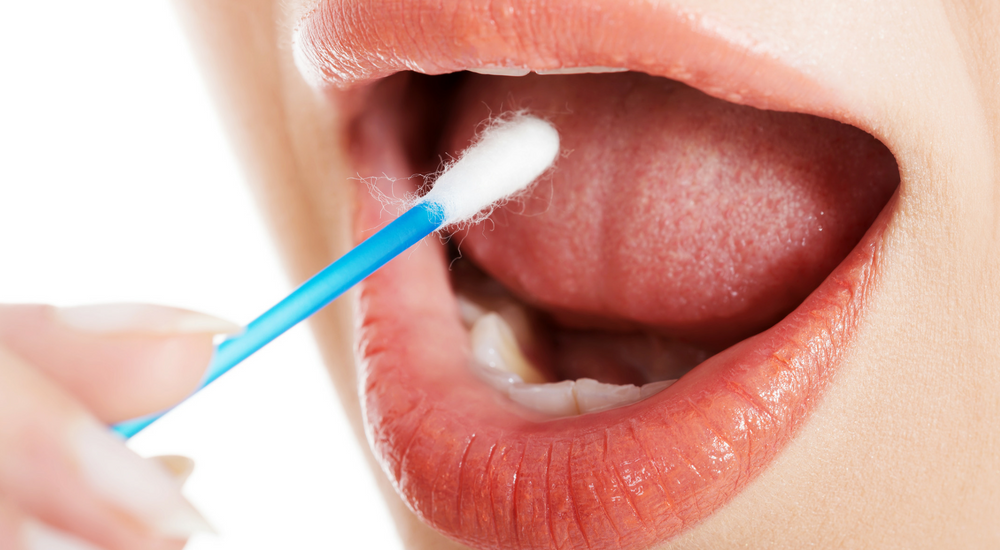Once you have made the all-important decision to have a paternity test, you may then have questions about the practicalities of actually getting and carrying out the test.
One of the main concerns that people have is whether doing the test will be painful for the child. It is possible for many different sample types to yield a good amount of DNA, but the fear for many is that a blood sample is needed to carry out an accurate paternity test. Fortunately, expert labs like DDC do not need blood samples (with the exception of prenatal paternity testing). In most cases, once the child has been born all we will need is a simple and painless buccal swab. These swabs are rubbed gently inside the cheek to collect the surface cells.
There are rare occasions when other samples may be used and we will explore those here for you. It is indeed possible to use saliva and blood, but we will demonstrate why excellent labs like ours tend to use the cells from the inside of the cheek.
Are Saliva Samples Used for DNA Paternity Testing?
It is possible to use saliva (spit) for a DNA test; here are the advantages and disadvantages:
Advantages:
- Samples can be collected easily and painlessly without the using needles
- It is possible to collect a good amount of viable DNA easily and with a relatively small sample
Disadvantages:
- It would be very challenging if not impossible to collect a saliva sample from a young child or a newborn. Also, the risk of contaminating that type of sample is relatively high
- The equipment needed to collect a spit sample is a significant expense that would impact the overall cost of a test. It would require a special receptacle that would also have to include a liquid preparation to preserve the DNA sample.
Would We Ever Use Blood for Paternity Testing?
Often people say that DNA is DNA so what does it matter what sample you get it from? This is true, but some samples are easier to collect and stay viable longer because they don’t need to be stored in a particular way. This is generally why a mouth swab is an ideal sample. It is cheap to do, easy for the customer, and doesn’t need any special storage to maintain the integrity of the sample. Occasionally we do need a blood sample to process a test, but these cases are unusual and are very specific to a case type.
When a blood sample is necessary: Reason #1
In the case of prenatal paternity testing we do require a blood sample from the mother of the fetus simply because we have to access the child’s cells that are found in the mother’s bloodstream. The fetal cells in the mother’s blood are what provide us with the child’s DNA profile so that it can be compared to the DNA profile of the alleged father. The alleged father’s sample would still be a mouth swab for this purpose
When a blood sample is necessary: Reason #2
At DDC we do offer a paternity testing service for when the alleged father has passed away. In these cases, the coroner will have taken a blood sample as part of a postmortem and this might be the only sample available for testing
PROS:
- It is highly unlikely that a sample of this nature could become contaminated
CONS:
- Many people have a genuine fear of needles that can exacerbate what may already be a very stressful situation. The collection itself can be painful. Blood sample may also need to be kept cold so some kind of chilling mechanism would need to be put in place, which can be difficult when transporting blood samples to the lab
Why it is Preferable to use Cheek Swabs Whenever Possible
Your paternity testing kit comes with three (3) sets of cheek (buccal) swabs, with each set containing four (4) individual swabs. Buccal swabs are not ordinary cotton buds—they are made of a synthetic fibre that gently and effectively captures cheek cells when it is rubbed against the mucous membrane inside the cheek. There are good reasons why this are the preferred method of DNA sample collection.
PROS:
- Swabs are very efficient and also relatively inexpensive to produce. Each person being tested provides four swabs to ensure the lab gets a good sample to test. Because the swabs don’t cost as much as collection vials for spit, they do not impact the cost of the paternity test
- It is simple to collect these samples and completely painless. Swabs can even be used on newborn babies
- Swabs are so stable a sample that, when stored under cool and dry conditions, they can last for six months in their paper swab envelopes once the sample has been collected
- It is more cost-effective and much faster for a lab to extract DNA from a cheek swab than from a blood sample
CONS:
- It is highly unlikely but possible for cheek swabs to be contaminated if the customer does not follow the collection instructions. Fortunately our highly-experienced staff would be able to identify any contamination if this did happen and would just request a new sample.
The Bottom Line
In a nutshell, it is clear that using a mouth swab is preferable in all cases unless there is an absolute need to use a blood sample.
If you need additional information about a DNA paternity test or want to order, contact our experienced customer-service team on 0800 009 2969.

